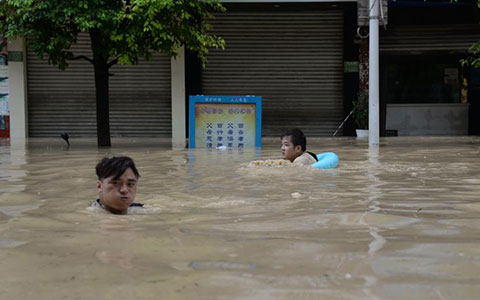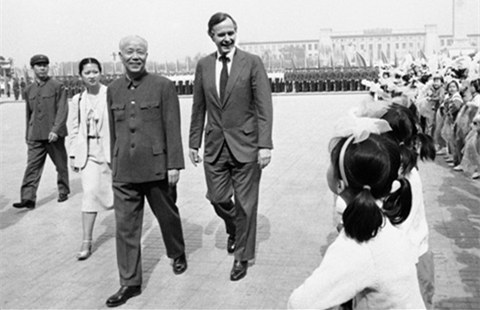Power and the glory
Updated: 2015-07-17 14:50
By Luo Weiteng(China Daily USA)
|
||||||||
|
The power industry is a rewarding place to be in as it produces something that is so essential and fundamental to daily life, says CLP Holdings Chief Executive Officer Richard Lancaster, who has been with the company for more than two decades. Parker Zheng / China Daily |
The future is brightly lit as CLP boss Richard Lancaster recounts the utility provider's shining history stretching back more than a century. Luo Weiteng reports.
Tranquil and serene Kowloon Bay glows in the sunlight as it stretches away to meet the sky.
Taking in the view from the CLP building at Hung Hom, Kowloon, is Richard Lancaster who, with his characteristic smile, recalls the company's more than a century old history in Hong Kong.
From a humble beginning providing street lighting in Kowloon, CLP Holdings has grown into the larger of Hong Kong's two power utilities, supplying to 80 percent of the local population. "Previously, the power industry was one that not many people would talk about. It was something we took for granted by just turning on a switch and expecting the electricity to be there," said Lancaster, chief executive officer at CLP Holdings.
The power industry has lately gone through a lot of dramatic transformations amid a spate of significant environmental protection issues, with changes in both energy production and consumption modes, he noted.
Echoing the SAR government's cleaner-energy goals, the role of CLP in the power industry has changed enormously, from just producing power at the cheapest price to attaching great importance to reliability, more so than ever before, while equally managing the environmental impact, Lancaster said.
Betting big on the Chinese mainland and India, the Hong Kong-headquartered power firm is switching its long-time growth focus away from Australia, which it spent 15 years building an asset portfolio and grew to become the country's third-largest power utility.
Having set up shop in Hong Kong more than a century ago in 1901, CLP has grown beyond its borders to Chinese mainland, India and Australia over the past 20 years.
The core business of the city's largest power firm is still Hong Kong, where it was founded and is headquartered, said Lancaster.
When CLP Power turned on its first generator in Hong Kong over a century ago, at a time when electricity was still a novelty worldwide, the territory's total power demand was just one tenth of a megawatt (MW).
Having enjoyed the highs and weathered the lows of the city's fortunes, CLP has grown into a behemoth comprising more than 70 assets with over 22,000 MW of capacity and serving more than 5.8 million people in Kowloon and the New Territories.
But the best growth opportunities emerge from the Chinese mainland and India, economic powerhouses with an insatiable appetite for investment in the power industry and which also struggle to deal with localized air pollution and climate change.
This is where CLP comes in, by focusing on providing renewable energy and high-efficiency coal-fired-power, observed Lancaster.
In Australia, where CLP has faced multiple setbacks, it will focus on getting value from previous investment rather than plowing more money into the market.
The blue-chip company entered the mainland market as early as 1979, supplying electricity for Guangdong province to develop the local economy.
As at the end of last year, it boasts more than 40 projects in 15 cities and provinces with a total capacity of about 7,629 MW.
CLP's "bold move" came in 1994, when it invested in the Guangdong Nuclear Power Station (GNPS) in Daya Bay, the first commercial nuclear power station on the mainland, nearly a decade after the company began to invest in the power sector there. Almost 70 percent of electricity generated by GNPS, in which CLP owns a 25 percent stake through a subsidiary, was imported by CLP to Hong Kong, feeding more than a fifth of the local power consumption.
That import ceiling was lifted to 80 percent for late 2014 to 2018.
Supply curve
However, not everyone in Hong Kong is keen on relying on the mainland for energy supply, especially nuclear energy.
A plan to import 30 percent of the city's power from the mainland grid to meet environmental protection goals fired a yearlong debate and has been shelved for the moment, with a majority of people citing energy reliability as the chief concern.
It has been suggested that half the city's electricity supply should come from local natural gas plants. June 30 saw the close of the second three-month consultation on how the SAR should be powered, and the future development and regulatory framework of the electricity market.
Lancaster believes the city's energy future really lies in striking a balance between energy reliability, environmental performance and costs, and there are no absolute solutions. Local gas generation may meet the city's immediate electricity needs, whereas in the long run, the increasingly reliable supply of low carbon energy from the mainland at a reasonable cost would stand as a good alternative, he noted, adding that a combination of the two approaches may offer more energy options for the territory.
The densely populated SAR relies heavily on reliable power supply, an such reliability is backed up by a diversity of options.
"Tens of billions of dollars" therefore would be needed for energy infrastructure, a handful of new gas units, and a new cross-border interconnector whose lead time, CLP estimates, would take at least 10 years.
The just-concluded public consultations also reflect calls for a more open market now dominated by CLP and HK Electric, held by Li Ka-shing controlled Power Assets.
"In the capital-intensive power industry, competition isn't necessarily the answer to more affordable supply and better consumer interest," said Lancaster. In countries and regions with more competitive markets such as Australia, electricity prices are much higher, almost twice as much as in Hong Kong.
"The power industry in Hong Kong is something we should feel proud of," said Lancaster. "The standards it enjoys really set Hong Kong above most metropolises in the world."
Contact the writer at sophia@chinadailyhk.com
(China Daily USA 07/17/2015 page6)

 Unusual but true: inspirational art lights the way
Unusual but true: inspirational art lights the way
 Jury decides Colorado theater shooter guilty
Jury decides Colorado theater shooter guilty
 Top 10 global cities in greenfield FDI
Top 10 global cities in greenfield FDI
 Thangka art booms in Regong
Thangka art booms in Regong
 UK students experience Chinese culture in Tianjin
UK students experience Chinese culture in Tianjin
 World's first figure 8 Ferris Wheel to be opened in Macao
World's first figure 8 Ferris Wheel to be opened in Macao
 Heavy downpour hits SW China
Heavy downpour hits SW China
 Wan Li: A life in photos
Wan Li: A life in photos
Most Viewed
Editor's Picks

|

|

|

|

|

|
Today's Top News
China faults Japan's new security bills
Chinese national pleads guilty in Pennsylvania to test-taking scam
Industries should be on digital Silk Road to expand market
Lengthy rehab expected for elder George Bush
UN Security Council to vote Monday on endorsing Iran deal
China's GDP grows by 7%
Japan passes disputed bill
Petcoke called key in pollution fight
US Weekly

|

|







